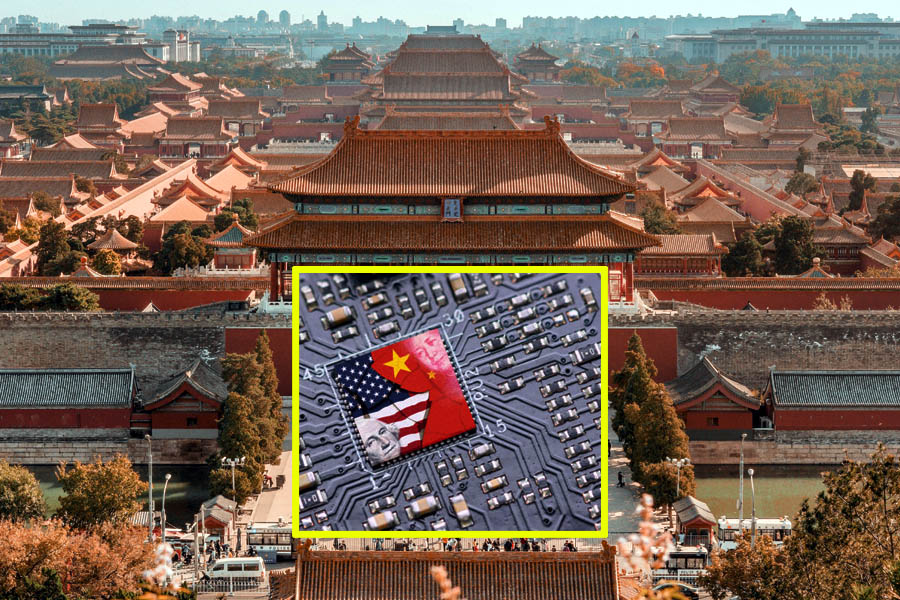
The business and diplomatic ties between the United States and China are facing significant challenges, with the Biden administration grappling with inflation and China experiencing worrisome signs of deflation. These issues, along with escalating geopolitical tensions, are shaping the evolving landscape of these two global economic powerhouses.
Inflation and Deflation Concerns:
Over the past 18 months, the United States has grappled with the formidable task of controlling inflation, while China faces the opposite issue—threatening deflation. Consumer prices in China declined in July, marking the first such drop in over two years. Moreover, wholesale prices have consistently fallen for ten consecutive months, raising concerns about the specter of deflation. This decline in prices not only impacts households' net worth but also poses challenges for borrowers repaying their loans.
Deflation's Impact on China:
Deflation presents a particular concern for China due to its high debt levels. China's total debt now exceeds its national economic output, making the potential consequences of deflation more severe. Despite official denial, economists express unease over the possibility of deflation taking root in the Chinese economy. Government measures to stimulate economic growth and rebuild confidence are urgently needed to counteract the threat of deflation.
Economic Slowdown and Geopolitical Tensions:
China's economy, the world's second-largest, has shown signs of slowing down despite early bursts of energy after the relaxation of pandemic-related restrictions. This slowdown intensifies the urgency for the Chinese government to implement measures to revive growth and instill confidence. Meanwhile, the ongoing geopolitical tensions are pushing the United States, Germany, and other key economic partners to explore alternative sources for manufactured goods, contributing to a weakened demand for Chinese exports.
Impact on China's Export Market:
China's export market is facing challenges as both domestic and foreign buyers display reduced interest in Chinese goods. This shift is evident in a steep decline in exports over the summer. This decreased demand is driven by a combination of reduced consumer spending in the developed world and efforts to diversify supply chains away from China. Wang Dan, Chief Economist at Hang Seng Bank China, underscores this challenge and the need for China to adapt to changing market dynamics.
Real Estate and Financial Concerns:
Consumer prices in China dropped by 0.3 percent in July, primarily due to falling food and car prices. Additionally, producer prices fell by 4.4 percent, reflecting weak demand and resultant price cuts by businesses. An alarming trend is the plummeting real estate prices, with existing home prices in 100 Chinese cities decreasing by an average of 14 percent from their peak. The government's efforts to control prices are being countered by creative strategies by developers to offer discounts, complicating accurate data interpretation.
Policy Responses:
To combat deflation, traditional economic remedies involve increasing the money supply by encouraging lending. However, in China, a lack of interest in borrowing among companies and households hampers such efforts. The government faces the challenge of stimulating economic activity while maintaining manageable debt levels, particularly considering China's extensive overall debt.
Geopolitical Tensions and Biden Administration:
The increasing strain in U.S.-China relations is not only economic but also geopolitical. The Biden administration has taken steps to restrict certain investments in China, citing national security concerns. While efforts have been made to ease relations through dialogues and discussions, the administration's focus on securing critical supply chains and technology has led to heightened restrictions on certain technologies and financial flows between the two nations.
Stateside, discussions are underway regarding curtailing investments in China due to national security concerns. Sectors deemed as security risks, such as quantum computing, artificial intelligence, and advanced semiconductors, are under scrutiny. The aim is to impede the transfer of funds and expertise to China in these pivotal sectors. The U.S. government seeks to address security threats without unduly disrupting legitimate business interactions between the two nations.
While China has faced foreign investment restrictions before, the U.S.-China financial relationship had largely remained open—until now. Recent developments indicate a paradigm shift, with the U.S. planning measures to restrict select investments in China. This move intends to safeguard U.S. interests and national security.
The success of these measures hinges on effective communication, enforcement, and collaboration with key industry players in fields like technology and finance. It's vital to recognize that China's economic hurdles extend beyond security-driven concerns, involving broader structural challenges that necessitate domestic and international economic adjustments.